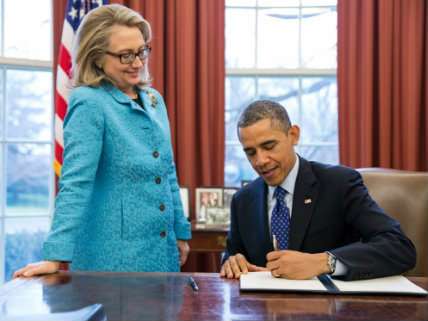Tonight's Democratic Debate Between Bernie Sanders and Hillary Clinton is Really a Debate About President Obama

Tonight's Democratic debate in New Hampshire is one of four additional contests scheduled just this week, and it will be the first to feature candidates Hillary Clinton and Bernie Sanders head to head, without Maryland Gov. Martin O'Malley on stage.
That these four officially sanctioned debates were added so late in the contest is, among other things, a recognition by Democrats that their primary race is something few predicted six months ago: a real race.
Bernie Sanders, the self-declared democratic socialist from Vermont, has outperformed almost everyone's expectations in both support and fundraising, drawing Hillary Clinton to a virtual tie in the Iowa caucus this week after grinding down her 30-point lead. It was an impressive showing, and revealed both that Clinton is weaker than was widely assumed, and that Sanders and his message have a large audience in the Democratic party.
Hillary Clinton is still the strong favorite to win the nomination, but even still, the debates will serve as a forum to publicly hash out the future of the Democratic party.
Clinton is running as the practical, pragmatic candidate, the status-quo incrementalist in part because that's who she is, but in part because that's the direction she believes that's the direction the party should go.
Sanders, conversely, is running explicitly as a revolutionary who would pursue wholesale overhauls of everything from the tax system to health care to campaign finance.
That Sanders has been so unexpectedly successful with this message is a testament to his authenticity and charm, and his surprising effectiveness as a campaigner.
But it's also a reminder that there remains a pervasive and widespread dissatisfaction on the left with the status quo, some of which has to do with the general state of politics and polarization in Washington, but much of which is bound up in a brewing frustration with the Obama administration.
Hillary Clinton is explicitly running as the candidate who will protect and, if politically possible, carefully build on the liberal gains made under President Obama. This is clearest when it comes to health care, where she and Sanders have been squabbling over Sanders' support of single payer.
"We have accomplished so much already," she said in a debate last month. "I do not to want see the Republicans repeal it, and I don't to want see us start over again with a contentious debate. I want us to defend and build on the Affordable Care Act and improve it."
Defend. Build on. Improve. This is the kind of language that Hillary Clinton consistently uses when talking about the Obama administration's legislative victories. It wouldn't be perfectly accurate to say she's running for Obama's third term, but it wouldn't unfair either. The point that she's made, explicitly and implicitly, through out the campaign is that if you like what the Obama administration has done, and want to see that work preserved and protected, Hillary Clinton is your candidate.
That so many Democrats seem disinclined to stick with her suggests their frustration with the Obama administration's policies and approach to politics.
So tonight's debate won't just be a battle over the future of the Democratic party, and whether it will choose the path of Hillary Clinton and the status quo or Bernie Sanders and his revolution. It will be a debate over the merits of the present administration, and its legacy in the Democratic party's imagination.
Conservatives and libertarians might be confused by the progressive left's frustration with President Obama, who is, for better or worse, one of the most successful and consequential liberal presidents in the modern era by most any measure.
But in many ways, it resembles the same sort of frustration with President Bush and congressional Republicans that boiled up on the right during President George W. Bush's administration, erupted with the Tea Party in 2010, and continues to reverberate throughout the right in all sorts of surprising and unexpected ways. That's something that Republicans should keep in mind in their assessments of the left, especially if they believe they might win the presidency in November. And it's that Democrats should watch out for this season as well. Bernie Sanders and Hillary Clinton may represent Democrats' current choices, but folks like Ted Cruz and Donald Trump may be the better illustrations of the party's longer-term future.


Show Comments (20)